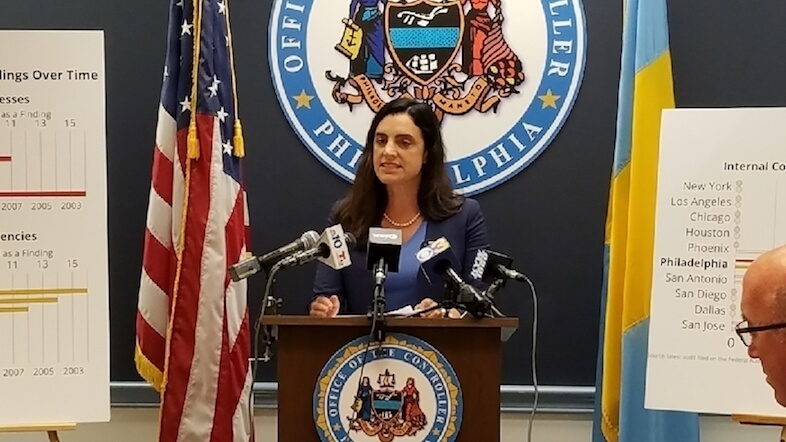Philadelphia City Controller Rebecca Rhynhart, six months into office, released her first major report on overall bookkeeping within Philadelphia city government on Tuesday. Sadly, it seems the books have problems that rank among the worst nationwide, Rhynhart found.
Rhynhart’s report on control and compliance in fiscal year 2017 details issues in city accounting practices which led to $924 million in “undetected, material misstatements” and $33 million going unaccounted in one fund.
“The material weaknesses and significant deficiencies in internal control over financial reporting are not isolated incidents; they are indicative of a much larger problem. Philadelphia has serious issues with its financial management,” Rhynhart said in a statement. “Compared to the other top 10 largest cities, Philadelphia has by far the largest number of reportable internal control findings.”
In a national comparison, is way above other big cities in these problems, trailed most closely by San Antonio, Texas; and San Jose, California.
A recently revealed in $33 million discrepancy in Philadelphia’s consolidated cash fund was due to the account not being properly reconciled for nearly three years, from fiscal year 2015 through the first 11 months of 2017, Rhynhart said. Some six other city accounts also haven’t been reconciled, some as far back as 2010, although those accounts didn’t have as big discrepancies.
Mayor Kenney’s office acknowledged issues with city accounts going unreconciled, which it said it is actively addressing.
“We thank the controller for her attention to this issue, which started under the previous administration. We share her sense of urgency, and have taken the appropriate steps to resolve it,” Kenney spokesman Mike Dunn said in an email. “We obviously wish this could be fixed overnight, but a problem like this requires time to be fully resolved responsibly. We look forward to completing this process by year’s end.”
The city brought in accounting firm Horsey, Buckner & Heffler, LLP to help with the missing $33 million, of which about 30 percent has since been accounted for.
“We are confident that the funds will be fully accounted for as we work through that process,” Dunn said, noting that Kenney has also started a Reconciliation Task Force to address the broader issues and created new internal controls to prevent such large discrepancies from happening again.
The $924 million in errors, which were later caught and corrected by auditors at the controller’s office, were due to factors like inadequate staffing levels, high turnover, lack of technological investment – the city still uses Lotus 1-2-3, IBM software first released in 1983 and taken off the market in 2013 – and insufficient oversight, according to the report.
“While I want to acknowledge that Finance has a plan for the bank reconciliation issues, Finance’s response to nearly $1 billion in accounting mistakes, without a timeline or action plan to address it, is woefully insufficient,” Rhynhart said in a statement.
Other general issues cited in the report include failure to segregate payroll duties, which could allow fraud to occur, allowing unauthorized individuals to approve bi-weekly payrolls, and payment vouchers being approved without required management authorization. Rhynhart stressed that these types of problems could potentially cause serious damage to Philadelphia’s credit rating.
Read the controller’s full report at philadelphiacontroller.org.






























